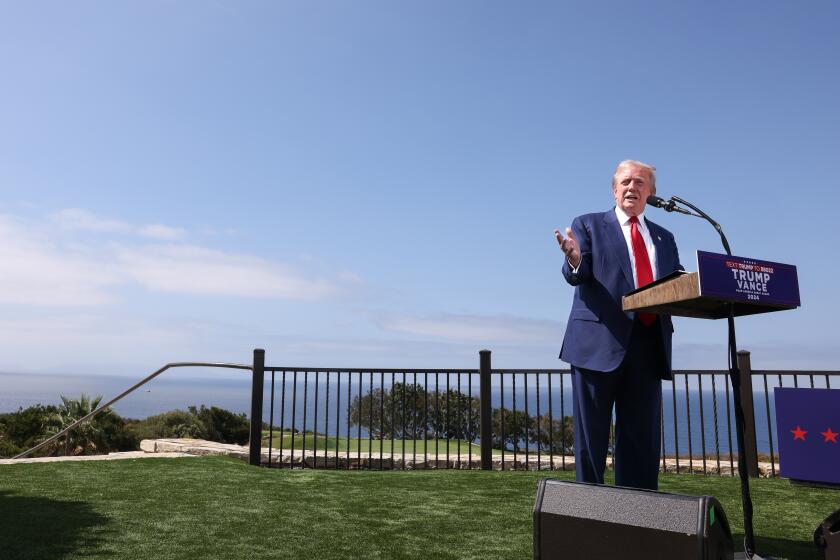On 2004 Trail, Edwards Offers Rural Development Initiative
Sen. John Edwards (D-N.C.) on Wednesday opened a new front in his party’s 2004 presidential race with a plan to revitalize rural America, while Sen. Joseph I. Lieberman (D-Conn.) edged into the campaign debate already raging over health care.
Edwards, campaigning in Nevada, Iowa, laid out a proposal to encourage more investment and technological development in agricultural communities.
In Washington, Lieberman proposed creating a new federal institute to intensify research against chronic diseases, such as diabetes and arthritis.
The speeches continue the flurry of proposals that the nine contenders for the 2004 Democratic nomination are using to define themselves in the crowded race.
Edwards’ focus on rural needs advances his effort to present himself as the most viable Democrat in small-town and Southern communities that voted overwhelmingly for President Bush in 2000. And Lieberman, by promising that his health-care proposals will be “practical and affordable,” continued his attempt to identify himself as the contest’s most centrist and fiscally responsible contender.
Edwards, who was raised in a small textile mill town in North Carolina, said his proposal targeted an economic slowdown that “has become a permanent way of life for much of rural America.” He accused Bush of ignoring rural problems and also took aim at his fellow Democrats as he spoke in the largely rural state whose caucus will open the Democratic race in January.
“Too many Democrats too often act like rural America is just someplace to fly over between a fund-raiser in Manhattan and a fund-raiser in Beverly Hills,” he said.
To revive rural communities, Edwards offered a series of initiatives with a price tag his staff estimated at $7 billion over 10 years. Key among them:
* A new $200-million-a-year federal fund to subsidize rural financial institutions that would make loans to encourage small-business development in agricultural communities;
* Creation of revitalization zones, modeled on the urban empowerment zones launched under President Clinton, that would provide tax credits to attract businesses to rural communities that have lost jobs due to foreign trade;
* Greater federal investment to speed the development of broadband Internet technologies in rural areas and subsidies to encourage young people to teach in these regions.
Edwards also called for increased use of ethanol, a corn-based fuel additive, in gasoline. That position draws strong support in the Midwest as a boost to agriculture, but others worry about the potential cost effect on gasoline.
Last year, fearing higher costs at the pump in California, Sen. Dianne Feinstein (D-Calif.) offered an amendment to give states more freedom to opt out of federal requirements to increase the use of ethanol. Edwards, Lieberman and the other two Democratic senators running for president, John F. Kerry of Massachusetts and Bob Graham of Florida, voted against it.
Edwards on Wednesday proposed federal subsidies to build “bio-refineries” in rural communities that would create fuels from agricultural wastes, such as corn husks. “Instead of buying oil in the Middle East, we can grow our energy here in the Midwest,” he said.
Edwards also tried to defuse what could be a significant political problem for him in Iowa. Alone among the senators in the race, Edwards last year voted against legislation that would ban big meat packers from owning hog or cattle farms. Such corporate ownership is common in North Carolina. But the issue is an emotional one in Iowa, where many farmers and environmentalists say huge corporate hog farms stifle competition and despoil the environment.
On Wednesday, Edwards said he would deal with the issue through tougher enforcement of environmental and antitrust laws, rather than an ownership ban.
But Neil Harl, an agricultural economist at Iowa State University, said tougher antitrust enforcement would probably have only a limited effect on the problems that critics attribute to the corporate farms.
“I’ve urged we use antitrust as far as it can go,” Harl said. “But I just don’t think it goes far enough.”
Edwards said he would pay for his initiative by repealing several corporate subsidies and banning federal commodity price-support payments to farmers with annual incomes of $1 million or more.
Lieberman’s speech was the first of four that he said he will give addressing the key health-care issues: “cures, coverage, costs and quality.”
He proposed creating an American Center for Cures meant to accelerate the development of treatments; the facility would be patterned after the National Institutes of Health. While the NIH is “the greatest center of basic health research in the world,” Lieberman said, it was not designed “to quickly move breakthroughs from the laboratory to your medicine cabinet.”
Lieberman said he would speed that process by subsidizing public-private partnerships for developing new drugs and other treatments aimed at diseases ranging from Parkinson’s disease to sickle cell anemia. He pledged $150 billion for the initiative in the next decade, although aides predicted that royalties from new drugs developed with federal help would cover up to half the cost.
Lieberman strongly suggested that the plan he eventually offers to increase access to health insurance will be more targeted and less expensive than those offered by several of his rivals in the Democratic race.
Kerry, former Vermont Gov. Howard Dean and Rep. Richard A. Gephardt (D-Mo.) have offered plans to expand coverage with 10-year price tags that range from roughly $900 billion to $2.5 trillion. Lieberman said his proposal “will not be a big-government, big-spending program” and would “use the power of the market, not work against it.”
More to Read
Get the L.A. Times Politics newsletter
Deeply reported insights into legislation, politics and policy from Sacramento, Washington and beyond. In your inbox three times per week.
You may occasionally receive promotional content from the Los Angeles Times.










